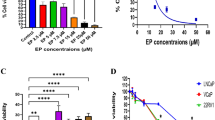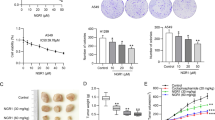Abstract
Background
Pancreatic cancer-gemcitabine (GEM) chemoresistance has been demonstrated to be associated with enhanced NF-kB activation and antiapoptotic protein synthesis. The well-known capacity of omega-3 fatty acids (n-3 FAs) to inhibit NF-kB activation and promote cellular apoptosis has the potential to restore or facilitate gemcitabine chemosensitivity.
Methods
Four pancreatic cancer cell lines (MIA PaCa-2, BxPC-3, PANC-1, and L3.6), each with distinct basal NF-kB and differing GEM sensitivity profiles, were administered: 100 uM of (1) n-3FA, (2) n-6FA, (3) GEM, (4) n-3FA + GEM, or (5) n-6FA + GEM for 24 and 48 hours. Proliferation was assessed using the WST-1 assay. To define the mechanism(s) of altered proliferation, electron mobility shift assay for NF-kB activity, western blots of phoshoStat3, phosphoIκB, and poly(ADP-ribose) polymerase (PARP) cleavage were performed in the MIA PaCa-2 cell line.
Results
All cell lines demonstrated a time/dose-dependent inhibition of proliferation in response to n-3FA. For MIA PaCa-2 cells, n-3FA and n-3FA + GEM treatment resulted in reduction of I-kB phosphorylation and NF-kB activation when compared with n-6FA control. n-3FA and combination treatment also significantly decreased Stat3 phosphorylation, whereas GEM alone had no effect. n-3FAs and n-3FA + GEM groups demonstrated increased PARP cleavage, mirroring NF-kB activity and Stat3 phosphorylation.
Conclusions
n-3 FA treatment is specifically associated with inhibition of proliferation in these four pancreatic cell lines irrespective of varied gemcitabine resistance. An experimental paradigm to screen for potential contributory mechanism(s) in altered pancreatic cancer cellular proliferation was defined, and using this approach the co-administration of n-3 FA with GEM inhibited GEM-induced NF-kB activation and restored apoptosis in the MIA PaCa-2 cell-line.






Similar content being viewed by others
References
American Cancer Society: Cancer Facts and Figures 2007. Available http://www.cancer.org/downloads/STT/CAFF2007PWSecured.pdf. [accessed April 18, 2004]
Bromberg JF, Wrzeszczynska MH, Devgan G, Zhao Y, Pestell RG, Albanese C, Darnell JE Jr. Stat3 as an oncogene. Cell 1999; 98:295–303
Catlett-Falcone R, Landowski TH, Oshiro MM, Turkson J, Levitzki A, Savino R, Ciliberto G, Moscinski L, Fernandez-Luna JL, Nunez G, Dalton WS, Jove R. Constitutive activation of Stat3 signaling confers resistance to apoptosis in human U266 myeloma cells. Immunity 1999; 10:105–15
Garcia R, Jove R. Activation of STAT transcription factors in oncogenic tyrosine kinase signaling. J Biomed Sci 1998; 5:79–85
Greten FR, Weber CK, Greten TF, Schneider G, Wagner M, Adler G, Schmid RM. Stat3 and NF-kappaB activation prevents apoptosis in pancreatic carcinogenesis. Gastroenterology 2002; 123:2052–63
Garcea G, Dennison AR, Steward WP, Berry DP. Role of inflammation in pancreatic carcinogenesis and the implications for future therapy. Pancreatology 2005; 5:514–29
Arlt A, Gehrz A, Muerkoster S, Vorndamm J, Kruse ML, Folsch UR, Schafer H. Role of NF-kappaB and Akt/PI3K in the resistance of pancreatic carcinoma cell lines against gemcitabine-induced cell death. Oncogene 2003; 22:3243–51
Falconer JS, Fearon KC, Ross JA, Carter DC. Polyunsaturated fatty acids in the treatment of weight-losing patients with pancreatic cancer. World Rev Nutr Diet 1994; 76:74–6
Wigmore SJ, Barber MD, Ross JA, Tisdale MJ, Fearon KC. Effect of oral eicosapentaenoic acid on weight loss in patients with pancreatic cancer. Nutr Cancer 2000; 36:177–84
Fearon KC, Von Meyenfeldt MF, Moses AG, Van Geenen R, Roy A, Gouma DJ, Giacosa A, Van Gossum A, Bauer J, Barber MD, Aaronson NK, Voss AC, Tisdale MJ. Effect of a protein and energy dense N-3 fatty acid enriched oral supplement on loss of weight and lean tissue in cancer cachexia: a randomised double blind trial. Gut 2003; 52:1479–86
Lai PB, Ross JA, Fearon KC, Anderson JD, Carter DC. Cell cycle arrest and induction of apoptosis in pancreatic cancer cells exposed to eicosapentaenoic acid in vitro. Br J Cancer 1996 74(9):1375–83
Jordan A, Stein J. Effect of an omega-3 fatty acid containing lipid emulsion alone and in combination with 5-fluorouracil (5-FU) on growth of the colon cancer cell line Caco-2. Eur J Nutr 2003; 42:324–31
Sharma A, Belna J, Logan J, Espat J, Hurteau JA. The effects of Omega-3 fatty acids on growth regulation of epithelial ovarian cancer cell lines. Gynecol Oncol 2005; 99:58–64
Falconer JS, Ross JA, Fearon KC, Hawkins RA, O’Riordain MG, Carter DC. Effect of eicosapentaenoic acid and other fatty acids on the growth in vitro of human pancreatic cancer cell lines. Br J Cancer 1994; 69:826–32
Babcock TA, Helton WS, Hong D, Espat NJ. Omega-3 fatty acid lipid emulsion reduces LPS-stimulated macrophage TNF-alpha production. Surg Infect 2002; 3:145–9
Babcock TA, Novak T, Ong E, Jho DH, Helton WS, Espat NJ. Modulation of lipopolysaccharide-stimulated macrophage tumor necrosis factor-alpha production by omega-3 fatty acid is associated with differential cyclooxygenase-2 protein expression and is independent of interleukin-10. J Surg Res 2002; 107:135–9
Shirota T, Haji S, Yamasaki M, Iwasaki T, Hidaka T, Takeyama Y, Shiozaki H, Ohyanagi H. Apoptosis in human pancreatic cancer cells induced by eicosapentaenoic acid. Nutrition 2005; 21:1010–7
Ross JA, Maingay JP, Fearon KC, Sangster K, Powell JJ. Eicosapentaenoic acid perturbs signaling via the NFkB transcriptional pathway in pancreatic tumour cells. Int J Onc 2003; 23:1733–8
Doxbury M, Ito H, Zinner M, Ashley S, Whang E. siRNA directed against c-SRC enhances pancreatic adenocarcinoma cell gemcitabine chemosensitivity. M. JACS V 198, 6, pp. 953–9
G2/M Cell-Cycle Arrest and Apoptosis by n-3 Fatty Acids in a Pancreatic Cancer Model. Dekoj T, Lee S, Desai S, Trevino J, Babcock TA, Helton WS, Espat NJ. J Surg Res 2007 May 1; 139(1):106–12
Tevar R, Jho DH, Babcock T, Helton WS, Espat NJ. Omega-3 fatty acid supplementation reduces tumor growth and vascular endothelial growth factor expression in a model of progressive non-metastasizing malignancy. J Parenter Enteral Nutr 2002; 26:285–9
Dommels YE, Haring MM, Keestra NG, Alink GM, van Bladeren PJ, van Ommen B. The role of cyclooxygenase in n-6 and n-3 polyunsaturated fatty acid mediated effects on cell proliferation, PGE(2) synthesis and cytotoxicity in human colorectal carcinoma cell lines. Carcinogenesis 2003; 24:385–92
Novak TE, Babcock TA, Jho DH, Helton WS, Espat NJ. NF-kappa B inhibition by omega -3 fatty acids modulates LPS-stimulated macrophage TNF-alpha transcription. Am J Physiol Lung Cell Mol Physiol 2003; 284:L84–L89
Ko AH, Tempero MA. Systemic therapy for pancreatic cancer. Semin Radiat Oncol 2005; 15:245–53
Schniewind B, Christgen M, Kurdow R, Haye S, Kremer B, Kalthoff H, Ungefroren H. Resistance of pancreatic cancer to gemcitabine treatment is dependent on mitochondria-mediated apoptosis. Int J Cancer 2004; 109:182–8
Shi X, Liu S, Kleeff J, Friess H, Buchler MW. Acquired resistance of pancreatic cancer cells towards 5-Fluorouracil and gemcitabine is associated with altered expression of apoptosis-regulating genes. Oncology 2002; 62:354–62
Ross JA, Maingay JP, Fearon KC, Sangster K, Powell JJ. Eicosapentaenoic acid perturbs signalling via the NFkappaB transcriptional pathway in pancreatic tumour cells. Int J Oncol 2003; 23:1733–8
Author information
Authors and Affiliations
Corresponding author
Additional information
Supported by: NIDDK K08 DK DK60778 (Espat)
Rights and permissions
About this article
Cite this article
Hering, J., Garrean, S., Dekoj, T.R. et al. Inhibition of Proliferation by Omega-3 Fatty Acids in Chemoresistant Pancreatic Cancer Cells. Ann Surg Oncol 14, 3620–3628 (2007). https://doi.org/10.1245/s10434-007-9556-8
Received:
Revised:
Accepted:
Published:
Issue Date:
DOI: https://doi.org/10.1245/s10434-007-9556-8




